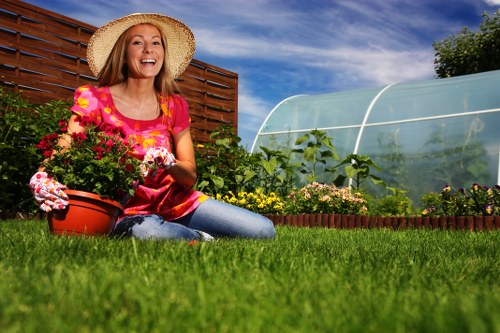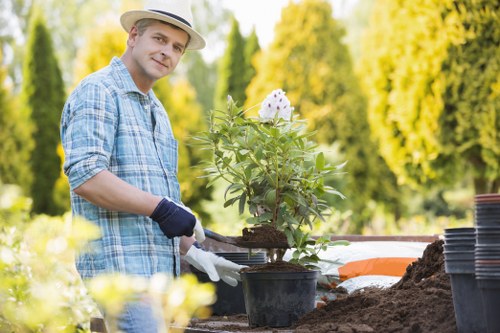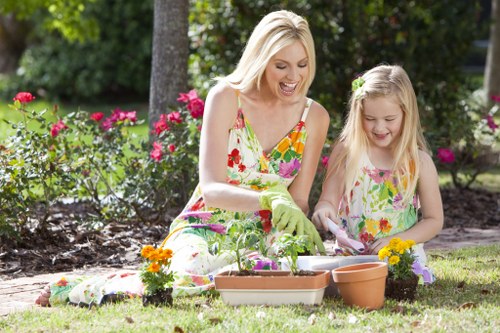Transforming Gardens: The Ultimate Guide to Landscaping in Notting Hill

Notting Hill, with its vibrant streets and picturesque homes, is a borough that epitomizes the charm of London living. Among its many attractions, the landscaping in Notting Hill stands out, offering residents and visitors alike a glimpse into the beauty and creativity that define this area. Whether you're a homeowner looking to upgrade your garden or a visitor inspired by the lush surroundings, understanding the intricacies of landscaping in Notting Hill can help you achieve stunning outdoor spaces.
Landscaping goes beyond mere aesthetics; it's about creating functional, sustainable, and harmonious environments that enhance the quality of life. In Notting Hill, where space can be limited and the urban setting is prevalent, thoughtful landscaping is essential. From private gardens to community green spaces, the approach to landscaping here is both innovative and deeply rooted in tradition.
In this comprehensive guide, we'll explore the key aspects of landscaping in Notting Hill, including design principles, popular plant choices, maintenance tips, and the benefits of professional landscaping services. Whether you're embarking on a new project or seeking to refine your existing garden, this guide will provide valuable insights to help you cultivate a beautiful and sustainable outdoor space.

Understanding the Landscape of Notting Hill
Notting Hill is renowned for its colorful houses, bustling markets, and diverse community. The area's unique geographical and cultural landscape plays a significant role in shaping its gardening and landscaping styles. Understanding the local climate, soil conditions, and architectural styles is crucial for successful landscaping.
The temperate climate of Notting Hill, characterized by mild winters and warm summers, allows for a wide variety of plant species to thrive. Gardeners and landscapers can take advantage of this climate by selecting plants that flourish in similar conditions, ensuring year-round beauty and sustainability.
Soil quality in Notting Hill varies, with some areas boasting rich, loamy soil ideal for a wide range of plants, while others may require soil amendments to improve fertility and drainage. Conducting a soil test is a recommended step before commencing any landscaping project to determine the best course of action for soil preparation.

Design Principles for Effective Landscaping
Successful landscaping in Notting Hill involves a blend of creativity and practicality. Here are some key design principles to consider:
- Balance: Achieve visual harmony by balancing plant sizes, colors, and textures.
- Unity: Ensure all elements of the garden work together cohesively.
- Contrast: Utilize contrasting colors and forms to add interest and depth.
- Focal Points: Create focal points such as water features, sculptures, or unique plants to draw attention.
- Scale and Proportion: Match plant sizes and garden structures to the overall space.
Applying these principles helps in creating a landscape that is not only beautiful but also functional and sustainable. Each element should serve a purpose, whether it's providing shade, attracting pollinators, or simply enhancing the visual appeal.
Additionally, considering the architectural style of the surrounding buildings can help in designing a garden that complements its environment, maintaining the aesthetic integrity of Notting Hill's iconic residences.

Popular Plant Choices for Notting Hill Gardens
The selection of plants is a critical aspect of landscaping in Notting Hill. Given the area's climate and soil conditions, certain plants thrive more than others. Here are some popular choices:
- Roses: Known for their timeless beauty and fragrance, roses are a favorite for many gardens.
- Lavender: Valued for its scent and ability to attract pollinators, lavender adds both beauty and functionality.
- Japanese Maple: With its striking foliage, the Japanese maple serves as an excellent focal point.
- Hostas: Ideal for shaded areas, hostas provide lush greenery and are easy to maintain.
- Succulents: Perfect for modern garden designs, succulents are low-maintenance and drought-resistant.
Incorporating a mix of perennials and annuals can ensure that the garden remains vibrant throughout the seasons. Additionally, using native plants can support local ecosystems and reduce maintenance needs.
Vertical gardening and container planting are also popular in Notting Hill, especially in areas with limited space. These techniques allow for creative use of space while maintaining the aesthetic appeal of the garden.

Maintenance Tips for a Thriving Garden
Proper maintenance is essential for sustaining the beauty and health of your garden. Here are some tips tailored for landscaping in Notting Hill:
- Regular Pruning: Keep plants healthy and shaped by pruning them regularly.
- Watering Schedule: Establish a consistent watering routine, considering the specific needs of your plants.
- Weed Control: Remove weeds promptly to prevent them from competing with your garden plants.
- Fertilization: Provide necessary nutrients through appropriate fertilization methods.
- Pest Management: Monitor for pests and diseases, and take action as needed to protect your plants.
Implementing these maintenance practices ensures that your garden remains vibrant and healthy. Additionally, seasonal tasks such as mulching, planting seasonal flowers, and preparing the garden for winter can help in maintaining its beauty year-round.
Investing time and effort into garden maintenance not only enhances the visual appeal but also contributes to the longevity and sustainability of your outdoor space.

The Role of Professional Landscaping Services
While DIY landscaping can be rewarding, professional landscaping services offer expertise that can elevate your garden to new heights. In Notting Hill, where aesthetic standards are high, hiring professionals can ensure that your landscaping project meets both your personal preferences and the area's architectural harmony.
Professional landscapers bring a wealth of knowledge in plant selection, design principles, and maintenance practices. They can provide personalized consultations, helping you choose the right plants and design elements that align with your vision and the environmental conditions of Notting Hill.
Additionally, professionals can handle complex tasks such as irrigation system installation, hardscape design, and integrating sustainable practices like rainwater harvesting or using native plants to support local wildlife.

Benefits of Hiring a Landscaping Professional
Engaging with a professional landscaping service offers numerous benefits:
- Expertise: Access to specialized knowledge and skills.
- Time-Saving: Professionals manage all aspects of the project, saving you time and effort.
- Quality Results: Assurance of high-quality workmanship and materials.
- Customization: Tailored solutions to meet your specific needs and preferences.
- Maintenance Support: Ongoing support to keep your garden in optimal condition.
By leveraging professional services, you can achieve a landscape that not only looks stunning but also adds value to your property. Their experience ensures that potential challenges are addressed proactively, resulting in a seamless and satisfying landscaping experience.
Furthermore, professional landscapers stay updated with the latest trends and sustainable practices, allowing you to incorporate modern and eco-friendly elements into your garden design.

Sustainable Landscaping Practices in Notting Hill
Sustainability is a key consideration in modern landscaping. In Notting Hill, sustainable practices not only contribute to environmental preservation but also enhance the resilience and longevity of your garden. Here are some strategies to incorporate sustainability into your landscaping:
- Use Native Plants: Native species are well-adapted to the local climate and require less water and maintenance.
- Water Conservation: Implement drip irrigation systems and rainwater harvesting to reduce water usage.
- Composting: Recycle garden waste into compost to enrich the soil naturally.
- Organic Practices: Use organic fertilizers and pest control methods to minimize chemical usage.
- Energy-Efficient Lighting: Opt for solar-powered or LED lighting to reduce energy consumption.
Adopting these sustainable practices not only benefits the environment but also often leads to cost savings in the long run. Sustainable landscaping promotes biodiversity, supports local ecosystems, and creates a healthier living environment.
Moreover, incorporating features such as green roofs, vertical gardens, and permeable pathways can further enhance the sustainability of your landscape, making it a model of eco-friendly design in Notting Hill.

Incorporating Hardscapes into Your Garden Design
Hardscaping elements play a crucial role in defining the structure and functionality of a garden. In Notting Hill, where outdoor space can be limited, integrating hardscapes can maximize usability and aesthetic appeal. Here are some popular hardscape features:
- Patios and Decks: Ideal for outdoor seating and entertaining.
- Walkways: Enhance accessibility and guide movement through the garden.
- Retaining Walls: Provide structural support and add visual interest.
- Water Features: Such as fountains or ponds, add tranquility and attract wildlife.
- Fire Pits: Create a cozy gathering spot for socializing.
Incorporating these elements requires careful planning to ensure they complement the natural aspects of the garden. Material selection, placement, and design should align with the overall theme and purpose of the landscaping project.
Professional landscapers can assist in blending hardscape and softscape elements seamlessly, ensuring that the garden remains both functional and visually appealing.

Seasonal Landscaping Tips for Notting Hill Gardens
Maintaining a beautiful garden in Notting Hill requires adapting to the changing seasons. Each season brings its own challenges and opportunities for enhancing your landscape. Here are some seasonal tips:
- Spring: Focus on planting new flowers, mulching, and preparing the garden beds.
- Summer: Ensure adequate watering, manage pests, and enjoy the peak blooming season.
- Autumn: Clean up fallen leaves, plant spring-flowering bulbs, and prepare plants for winter.
- Winter: Protect sensitive plants, plan for the upcoming year, and enjoy the serene beauty of a winter garden.
By addressing the specific needs of each season, you can ensure that your garden remains healthy and attractive throughout the year. Seasonal changes also provide an opportunity to introduce new plants and design elements, keeping your landscape fresh and dynamic.
Regular monitoring and timely interventions are key to managing seasonal transitions effectively, ensuring that your garden adapts gracefully to each change.

Maximizing Small Spaces in Urban Gardens
Notting Hill's urban environment often means dealing with limited garden space. However, with creative design and strategic planning, even small gardens can be transformed into lush retreats. Here are some strategies for maximizing small spaces:
- Vertical Gardening: Utilize vertical spaces with hanging plants, trellises, or vertical planters.
- Multi-Functional Furniture: Use furniture that serves multiple purposes, such as storage benches or foldable tables.
- Compact Plant Varieties: Choose plants that thrive in smaller containers or have a compact growth habit.
- Mirrors and Reflective Surfaces: Create the illusion of more space with mirrors or reflective garden decorations.
- Strategic Lighting: Use lighting to highlight focal points and enhance the perception of space.
Implementing these techniques can significantly enhance the usability and beauty of small gardens, making them a sanctuary amidst the urban bustle of Notting Hill.
Additionally, thoughtful storage solutions and minimalistic design can keep small spaces organized and visually appealing, ensuring that every inch serves a purpose.

Enhancing Curb Appeal with Landscaping
Curb appeal is a vital aspect of property value and personal satisfaction. In Notting Hill, where homes often feature distinctive architectural styles, landscaping plays a pivotal role in enhancing curb appeal. Here are some tips:
- Front Yard Design: Create a welcoming front yard with pathways, colorful flowers, and inviting seating areas.
- Driveway Landscaping: Use plants and hardscapes to define and beautify the driveway area.
- Lighting: Strategically placed lighting can highlight architectural features and provide safety.
- Consistent Themes: Ensure that the landscaping theme aligns with the style of the home for a cohesive look.
- Seasonal Decorations: Incorporate seasonal elements to keep the front of your home vibrant throughout the year.
Enhancing curb appeal through thoughtful landscaping not only makes your home more attractive but also increases its market value. A well-maintained garden reflects care and attention, leaving a lasting impression on visitors and potential buyers.
Collaborating with landscaping professionals can help in achieving a design that complements your home's architecture and meets your aesthetic preferences.

Integrating Sustainable Practices into Your Landscape
Sustainability in landscaping involves creating gardens that are environmentally friendly and resource-efficient. Here's how you can integrate sustainable practices into landscaping in Notting Hill:
- Rainwater Harvesting: Collect and use rainwater for irrigation to reduce water consumption.
- Composting: Turn organic waste into compost to enrich the soil naturally.
- Solar Lighting: Use solar-powered lights to minimize energy usage.
- Native Plant Selection: Choose plants that require less water and are resistant to local pests.
- Permeable Paving: Use permeable materials for walkways and patios to enhance water drainage.
These practices not only contribute to environmental conservation but also result in cost savings and a healthier garden ecosystem. Sustainable landscaping fosters biodiversity and creates a resilient garden that can withstand environmental challenges.
Moreover, integrating such practices aligns with the growing trend towards eco-friendly living, making your garden a model of sustainability in Notting Hill.

Innovative Landscaping Trends in Notting Hill
Landscaping trends evolve with changing tastes and advancements in design techniques. In Notting Hill, several innovative trends are shaping the way gardens are designed and maintained:
- Vertical Gardens: Maximizing vertical space to add greenery in compact areas.
- Smart Irrigation Systems: Utilizing technology to optimize watering schedules and conserve water.
- Edible Gardens: Incorporating fruit trees, vegetables, and herbs into garden designs.
- Minimalist Designs: Emphasizing clean lines and simplicity for a modern aesthetic.
- Wildlife-Friendly Gardens: Creating habitats that support local wildlife and pollinators.
Embracing these trends can modernize your garden and make it more functional and enjoyable. Staying informed about the latest landscaping innovations ensures that your garden remains contemporary and aligns with your lifestyle needs.
Collaborating with professional landscapers can help in seamlessly integrating these trends into your garden, ensuring a balanced and harmonious design.

DIY vs. Professional Landscaping: Making the Right Choice
Deciding between DIY landscaping and hiring professionals is a significant choice for homeowners in Notting Hill. Both approaches have their advantages and considerations:
- DIY Landscaping: Cost-effective, offers personal satisfaction, and allows for creative control.
- Professional Landscaping: Provides expertise, saves time, ensures high-quality results, and offers custom solutions.
While DIY projects can be fulfilling, they may require a substantial investment of time and effort, especially for larger projects. Professional landscapers, on the other hand, bring specialized knowledge and can handle complex tasks efficiently.
Ultimately, the decision depends on your budget, time availability, and the scope of your landscaping project. For intricate designs or large-scale transformations, professional services are often the preferred choice to ensure optimal results.

Enhancing Privacy in Your Garden
Privacy is a common concern for many homeowners, especially in bustling areas like Notting Hill. Effective landscaping can create private retreats within your garden. Here are some strategies:
- Hedges and Fences: Planting dense hedges or installing stylish fences can block unwanted views.
- Trellises and Arbors: These structures can support climbing plants, adding both privacy and aesthetic appeal.
- Strategic Plant Placement: Position tall plants or trees to create natural barriers.
- Garden Structures: Features like pergolas or gazebos can provide secluded spaces.
- Screening Plants: Use fast-growing plants for quick privacy solutions.
Incorporating these elements into your landscaping design ensures a sense of seclusion and tranquility, allowing you to enjoy your garden without disturbances.
Professional landscapers can help in selecting the right materials and plants to achieve the desired level of privacy while maintaining the overall harmony of the garden.

Creating Outdoor Living Spaces
Outdoor living spaces have become increasingly popular, providing areas for relaxation, dining, and entertainment. In Notting Hill, designing functional and inviting outdoor spaces can enhance your lifestyle. Consider the following elements:
- Seating Areas: Comfortable seating arrangements for socializing or unwinding.
- Dining Areas: Outdoor kitchens or dining sets for al fresco meals.
- Fire Features: Fire pits or outdoor fireplaces add warmth and ambiance.
- Shade Structures: Pergolas, umbrellas, or awnings to provide protection from the sun.
- Lighting: Soft lighting to create a welcoming atmosphere in the evenings.
Integrating these features transforms your garden into a versatile space that can be enjoyed throughout the day and night. Thoughtful design ensures that the outdoor areas are both functional and aesthetically pleasing.
Collaborating with landscapers can help in planning and executing these spaces effectively, ensuring that they complement the overall garden design.

Incorporating Art and Decor into Landscaping
Artistic elements and decor can add a unique personality to your garden, making it a reflection of your style. In Notting Hill, where artistic expression is celebrated, integrating art into landscaping enhances the visual interest and character of the space. Here are some ideas:
- Garden Sculptures: Artistic sculptures can serve as focal points or complement the garden's theme.
- Decorative Planters: Stylish planters add flair and can highlight specific plants.
- Mosaic Pathways: Intricate mosaics on walkways create beautiful patterns and textures.
- Water Features: Artistic fountains or ponds add movement and sound to the garden.
- Functional Art: Creative furniture or lighting fixtures that serve practical purposes while adding artistic value.
Incorporating art into landscaping allows for personal expression and can make your garden stand out. It's important to select pieces that resonate with your aesthetic preferences and align with the overall garden design.
Professional landscapers can assist in selecting and placing these artistic elements to ensure they enhance the garden's beauty without overwhelming it.

The Importance of Lighting in Garden Design
Lighting is a crucial component of garden design, influencing both functionality and ambiance. Effective lighting strategies can extend the usability of your garden into the evening and highlight key features. Consider the following lighting options:
- Path Lighting: Illuminate walkways for safety and guidance.
- Accent Lighting: Highlight specific plants, sculptures, or architectural features.
- Ambient Lighting: Provide overall illumination to create a warm and inviting atmosphere.
- Task Lighting: Ensure sufficient light in areas designated for activities like cooking or reading.
- Solar Lighting: Eco-friendly options that harness solar energy for sustainable illumination.
Integrating a variety of lighting types can enhance the visual appeal and functionality of your garden. Proper lighting design ensures that each area of the garden is showcased beautifully while providing necessary illumination for activities.
Working with professionals can help in planning a lighting scheme that complements your garden design and meets your specific needs.

Gardening Communities in Notting Hill
Notting Hill boasts a vibrant gardening community, with numerous clubs, workshops, and events catering to garden enthusiasts. Engaging with these communities can provide valuable knowledge, support, and inspiration for your landscaping projects. Here are some ways to get involved:
- Local Garden Clubs: Join clubs to connect with fellow gardeners and participate in group activities.
- Workshops and Classes: Attend workshops to learn new gardening techniques and trends.
- Community Gardens: Participate in community garden projects to collaborate on larger landscaping initiatives.
- Garden Tours: Explore local gardens through organized tours to gain design ideas and inspiration.
- Online Forums: Engage in online discussions and share experiences with other gardening enthusiasts.
Being part of a gardening community fosters a sense of belonging and provides opportunities to exchange ideas and resources. It also keeps you informed about the latest landscaping trends and best practices in Notting Hill.
Additionally, community involvement can lead to collaborative projects that enhance public green spaces, contributing to the overall beauty and sustainability of the borough.

Budgeting for Your Landscaping Project
Planning a landscaping project involves careful budgeting to ensure that all aspects are covered without overspending. Here are some tips for budgeting effectively:
- Define Your Scope: Clearly outline the extent of your project to understand the resources needed.
- Prioritize: Identify which elements are essential and which can be phased in over time.
- Get Multiple Quotes: If hiring professionals, obtain several quotes to compare prices and services.
- Allocate Funds for Unexpected Costs: Set aside a contingency budget for unforeseen expenses.
- DIY Where Possible: Reduce costs by handling tasks you are comfortable with yourself.
Creating a detailed budget helps in managing expenses and ensures that your landscaping project remains financially feasible. It also allows you to make informed decisions about where to invest and where to save.
Regularly reviewing and adjusting your budget as the project progresses can help in staying on track and achieving your desired outcomes without financial strain.

Choosing the Right Materials for Your Garden
The selection of materials plays a significant role in the durability and aesthetic of your landscape. In Notting Hill, where weather conditions can vary, choosing the right materials is crucial for a resilient garden. Consider the following:
- Hardscaping Materials: Opt for durable materials like natural stone, brick, or concrete for pathways, patios, and walls.
- Plant Containers: Choose containers made from weather-resistant materials such as terracotta, ceramic, or metal.
- Outdoor Furniture: Select furniture that can withstand the elements, such as teak, aluminum, or synthetic wicker.
- Mulch: Use organic or inorganic mulch to conserve moisture and suppress weeds.
- Decorative Elements: Incorporate materials that add texture and color, like mosaic tiles or glass ornaments.
Selecting high-quality, appropriate materials ensures that your garden remains functional and attractive over time. It also reduces the need for frequent replacements and maintenance.
Professional landscapers can guide you in choosing materials that align with your design goals and are suitable for Notting Hill's climate and soil conditions.

Integrating Technology into Landscaping
Modern technology offers innovative solutions for landscaping, enhancing both design and maintenance. Here are some ways to integrate technology into your garden:
- Smart Irrigation Systems: Automate watering schedules based on weather conditions and soil moisture levels.
- Garden Sensors: Monitor soil health, moisture levels, and plant conditions in real-time.
- LED Lighting: Energy-efficient lighting options that can be controlled remotely.
- Landscape Design Software: Use software tools to plan and visualize your garden layout.
- Automated Maintenance Tools: Robotic lawn mowers and other automated tools for efficient garden upkeep.
Incorporating technology into your landscaping not only simplifies maintenance but also enhances the overall functionality and aesthetics of your garden. Smart systems can lead to more efficient resource usage and a healthier garden ecosystem.
Consulting with landscaping professionals who are knowledgeable about the latest technologies can help in seamlessly integrating these innovations into your garden design.

Conclusion: Bringing Your Landscaping Vision to Life
Landscaping in Notting Hill offers a unique blend of creativity, sustainability, and functionality. Whether you're transforming a small urban garden or enhancing a spacious property, understanding the key elements of design, plant selection, maintenance, and sustainability is essential.
By leveraging professional landscaping services, engaging with the local gardening community, and staying informed about the latest trends and technologies, you can create a garden that not only beautifies your space but also enriches your lifestyle.
Ready to transform your garden into a stunning oasis? Contact us today to begin your landscaping journey in Notting Hill and bring your vision to life.